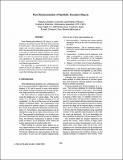Por favor, use este identificador para citar o enlazar a este item:
http://hdl.handle.net/10261/30268COMPARTIR / EXPORTAR:
 SHARE
BASE SHARE
BASE
|
|
| Visualizar otros formatos: MARC | Dublin Core | RDF | ORE | MODS | METS | DIDL | DATACITE | |

| Título: | Fast skeletonization of spatially encoded objects |
Autor: | Romero, Francisco; Ros, Lluís CSIC ORCID ; Thomas, Federico CSIC ORCID | Palabras clave: | Pattern recognition: Computer vision Computer vision |
Fecha de publicación: | 2000 | Editor: | Institute of Electrical and Electronics Engineers | Citación: | 15th International Conference on Pattern Recognition: 510-513 (2000) | Resumen: | Some thinning algorithms for 3D objects, or generalizations of existing ones for 2D, have been proposed in recent years. The paper presents a simple and very fast algorithm compared to most of them, and still it has theoretically favorable properties. It provides a connected surface skeleton that allows shapes to be reconstructed with bounded error. In addition, it is also very attractive because it allows discrete skeletons to be obtained directly from volumes in many representations without converting them to a voxel-based representation. Our algorithm is a generalization of the one presented by Cardoner et al. (1997) for 2D objects. It is based on the application of directional erosions, while retaining those voxels that introduce disconnection. | Descripción: | International Conference on Pattern Recognition (ICPR), Barcelona (España) | URI: | http://hdl.handle.net/10261/30268 | DOI: | 10.1109/ICPR.2000.903595 | ISBN: | 0769507506 |
| Aparece en las colecciones: | (IRII) Comunicaciones congresos |
Ficheros en este ítem:
| Fichero | Descripción | Tamaño | Formato | |
|---|---|---|---|---|
| doc1.pdf | 392,89 kB | Adobe PDF |  Visualizar/Abrir |
CORE Recommender
Page view(s)
308
checked on 22-abr-2024
Download(s)
208
checked on 22-abr-2024
Google ScholarTM
Check
Altmetric
Altmetric
NOTA: Los ítems de Digital.CSIC están protegidos por copyright, con todos los derechos reservados, a menos que se indique lo contrario.
